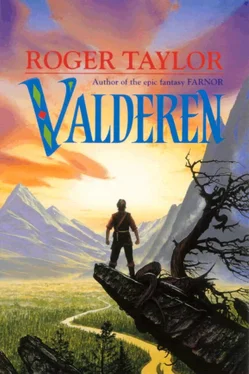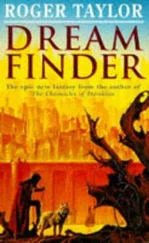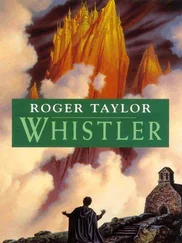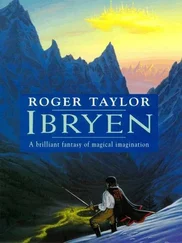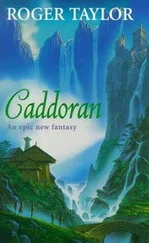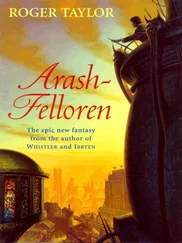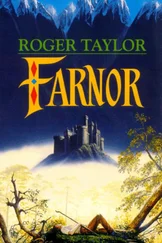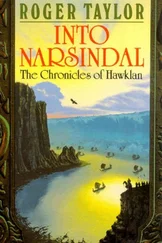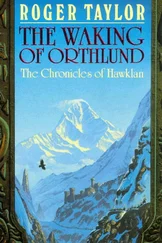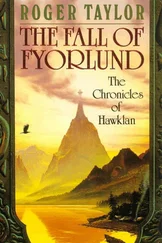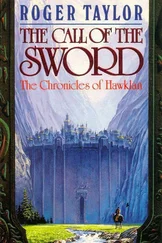Roger Taylor - Valderen
Здесь есть возможность читать онлайн «Roger Taylor - Valderen» весь текст электронной книги совершенно бесплатно (целиком полную версию без сокращений). В некоторых случаях можно слушать аудио, скачать через торрент в формате fb2 и присутствует краткое содержание. Жанр: Фэнтези, на английском языке. Описание произведения, (предисловие) а так же отзывы посетителей доступны на портале библиотеки ЛибКат.
- Название:Valderen
- Автор:
- Жанр:
- Год:неизвестен
- ISBN:нет данных
- Рейтинг книги:3 / 5. Голосов: 1
-
Избранное:Добавить в избранное
- Отзывы:
-
Ваша оценка:
- 60
- 1
- 2
- 3
- 4
- 5
Valderen: краткое содержание, описание и аннотация
Предлагаем к чтению аннотацию, описание, краткое содержание или предисловие (зависит от того, что написал сам автор книги «Valderen»). Если вы не нашли необходимую информацию о книге — напишите в комментариях, мы постараемся отыскать её.
Valderen — читать онлайн бесплатно полную книгу (весь текст) целиком
Ниже представлен текст книги, разбитый по страницам. Система сохранения места последней прочитанной страницы, позволяет с удобством читать онлайн бесплатно книгу «Valderen», без необходимости каждый раз заново искать на чём Вы остановились. Поставьте закладку, и сможете в любой момент перейти на страницу, на которой закончили чтение.
Интервал:
Закладка:
The expression of the old man in the black-edged mirror became baleful. For an instant it seemed to Gryss that he was the shallow, ephemeral image and that the face in the mirror was the real person. He turned away sharply, his breathing suddenly painful, so powerful and frightening was this impression, and so severe the judgement in the eyes that had looked into his.
The shock cleared his mind. What he could do, first of all, was use his head; he could think.
Somewhere there was a solution. The energy that was draining out of him in whining self-pity must be redirected towards finding that solution, however elusive and difficult it might prove to be. And he did not have the luxury of time at his disposal. With each day, he reasoned, Nilsson’s men would travel further and further abroad on their plundering raids; and too, in addition to those strangers who were wandering into the valley, like lesser predators following the scent of another’s kill, not all those who returned with the raiders were captives; some were, beyond a doubt, recruits. Rannick’s power would draw the worst out of men, and the worst of men. Gryss needed no military training to know that the armed strength of the garrison was growing relentlessly.
But what was Rannick up to? What could be the purpose of such a force? He obviously did not need it just to hold sway over the village. Gryss dismissed the questions before they began to lead him astray. They were irrelevant, at the moment. Whatever Rannick’s intentions were, all that mattered now was that they be frustrated.
He returned to his favourite chair. It creaked wel-comingly as he sat down and settled himself comfortably.
A dark measure of his position came to him first. He could do little or nothing alone. Further, whatever opposition he decided upon, he would have to persuade an increasingly large number of the villagers to accept and follow it as time passed. But who was to be trusted? There was no reason to suppose that the doubts and fears which were assailing him were not assailing everyone else, and, in all conscience he could not reproach anyone for throwing in their lot with the new masters of the valley. Yet this was only an intellectual conclusion; despite the truth of it, deep within himself he felt his benevolence fighting a stern battle with a powerful, emotional, reaction of anger and revulsion at such behaviour.
Still, he flattered himself that at least he could iden-tify those most likely to succumb to this, and keep them away from any plans that he might instigate. He reverted to his original question, and amplified it. Who was to be trusted? And who was going to be any use?
The first names that came to him were Garren and Farnor, and the shock of the emptiness that followed in their wake made him grimace. Tears started to his eyes again and he brushed them away roughly. The dead were dead, and should be buried, he shouted inside his head, so that he could pass this momentary crisis under cover of the noise. He forced himself to think of the living. Yakob he could trust, certainly. Harlen too, though he found it hard to imagine him as any great tower of strength. That would be the role of Jeorg, of course. His heart was full of a black and awful rage at Rannick and Nilsson and his various injuries were healing well, though it would be some time before he had the full use of his arm again. The only real problem with Jeorg would be keeping his tongue under control. Also, Gryss knew to his cost, it would be politic to keep Jeorg’s wife well away from any plotting and scheming. She was unequivocally of the opinion that what was happening was ‘none of their business’ and that it should be left to those ‘better suited to such matters’ or ‘no good would come of it’. To her mind, the logic of her husband’s cruelly beaten body was more than sufficient to sustain her argument, and she never elaborated on who such others ‘better suited’ might be. It would be a brave man who attempted to take her to task on such details.
It was not an uncommon view in the village, and, in her case, Gryss could sympathize completely.
There were others who could be relied on: Gofhern the blacksmith, Kestered the valley’s finest leather-worker, Bellan the school teacher. Gryss weighed them all carefully. None of them was a fighter, of course, but they were men who could hold their peace, and who were not afraid to ponder intractable problems. And, as with himself in his capacity as a healer, their skills brought them into contact with more people than most. This alone would keep him better informed of the attitude of the villagers than if he were alone.
Then Marna’s name came to him. He frowned. Much as he would have preferred to, he could not exclude her from any plans, as she would inevitably scent them out. And despite Farnor’s beating and subsequent mysteri-ous disappearance, she was still quite capable of undertaking some wild venture of her own if she thought that nothing was being done. Whatever he decided to do, he would somehow have to find a way of involving her that offered her no danger.
He settled on the group that he should approach initially: Yakob, Harlen, Jeorg and, reluctantly, Marna. Perhaps Gofhern, Kestered, Bellan and others later but, he realized, that would not be solely his responsibility by then.
He stood up, stretched, and went to stand for a while at the front door of the cottage. It was a fine summer’s day and everything about him was as it should be: birds singing, bright flowers everywhere, the air alive with rich scents, and all manner of small creatures bustling through the hedges and long grasses. Subtly marring it, though, was the darkness of the unexpected that now lay over everything like a clinging miasma. Throughout the years since his return, he had walked down into the village, knowing that while no two days were ever the same, he would meet nothing and no one that he would not have wished to meet. That had been such a truth in his life that it had never actually occurred to him before. But now, who could say what might lie around the familiar bends in the road? One of Nilsson’s men? Oddly restrained but arrogant and unpleasant for all that, and not infrequently drunk on ale ‘freely given’ at the inn. Or some sharp-eyed stranger seeking the way to the castle? Guards returning from duty downland? Or perhaps even another column of armed men returning from a raid over the hill and bringing with them more captives.
He picked up the carved iron ring and examined it thoughtfully. The soldiers etched into its surface seemed to reproach him. They were waiting too, but they were armed and ready; at some time in the past they had seen their destiny and prepared themselves for it. He found himself making an ironical inventory of all the weapons that he knew lay in the valley: a handful of rusty swords that had accumulated over the generations from who knew what sources; an equally small handful of bows which, like the swords, were a greater danger to the users and their immediate neighbours than to any enemy they might be levelled at; and, incongruously, he seemed to remember having seen two old pikes lying in a barn somewhere, though he could not recall now whether or not they hadn’t been made into pitchforks.
The fate of the pikes, however, was of little conse-quence. Not in his wildest imaginings could he envisage disciplined, serried ranks of villagers marching resolutely up to the castle to face Nilsson’s men; that, indeed, was a task for others ‘better suited’.
Which still left Gryss with his original problem. What could he, and his potential co-conspirators, do?
He put the ring down gently but the bell tinkled faintly, invoking a cursory rumble from the dog somewhere in the cottage. Closing the door behind him, he set off towards the village. The darkness of every-thing that Rannick and Nilsson had brought to the valley was still with him, but for the first time in many weeks he felt almost at ease with himself. It was a feeling that grew as he visited first Yakob, then Jeorg – ‘Just to see how he’s getting on,’ he said, smiling excessively at Jeorg’s wife – and finally Harlen. He gave no indication of his intentions, simply asking them to come round to his cottage that evening, ‘Just to talk about a few things.’
Читать дальшеИнтервал:
Закладка:
Похожие книги на «Valderen»
Представляем Вашему вниманию похожие книги на «Valderen» списком для выбора. Мы отобрали схожую по названию и смыслу литературу в надежде предоставить читателям больше вариантов отыскать новые, интересные, ещё непрочитанные произведения.
Обсуждение, отзывы о книге «Valderen» и просто собственные мнения читателей. Оставьте ваши комментарии, напишите, что Вы думаете о произведении, его смысле или главных героях. Укажите что конкретно понравилось, а что нет, и почему Вы так считаете.
